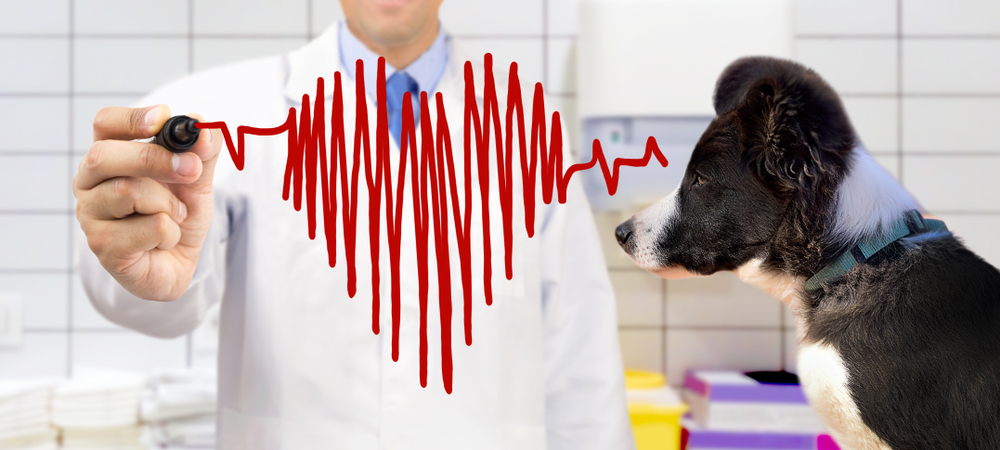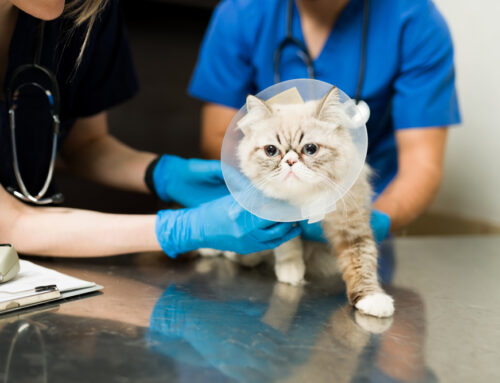A pet affected by a heart condition requires specialized care that only a board-certified cardiologist can provide. Our team at Stack Veterinary Hospital explains what issues can affect your pet’s heart and how your pet can benefit from a veterinary cardiologist’s expertise.
Common heart conditions in dogs
Dogs can be affected by numerous heart conditions that mostly cause signs that include a persistent cough, fatigue, difficulty breathing, and fainting. Some of the most common heart disease causes in dogs include:
- Degenerative mitral valve disease — It is estimated that 80% of heart disease in dogs is the result of degenerative mitral valve disease. The mitral valve separates the left atrium (i.e., top heart chamber) from the left ventricle (i.e., bottom heart chamber), and forms a tight seal that allows blood to be pumped into the left ventricle and out to the body. Degeneration of the mitral valve results in a thick and irregular valve, allowing blood to leak backwards into the left atrium, and sometimes the lungs, causing congestive heart failure. Small-breed dogs are most commonly affected, and Cavalier King Charles Spaniels are at a high risk by the time they reach 8 years of age.
- Dilated cardiomyopathy (DCM) — DCM occurs when the heart muscle becomes weak and thin, leading to dilation of the cardiac chambers. This inhibits sufficient blood flow throughout the body. Congestive heart failure, arrhythmias, and sudden death are common in dogs affected by DCM. DCM is inherited in some breeds, such as Great Danes, Doberman pinschers, and Irish wolfhounds. Infection and inflammation of the heart, hypothyroid disease, and chronic arrhythmias can also result in DCM. Finally, nutritional deficiencies resulting from feeding vegan diets, unbalanced home-cooked diets, and possibly some grain free, high-legume diets can also cause DCM.
- Pericardial Effusion — The pericardium consists of several thin layers of tissue that form a sac around the heart. Pericardial effusion occurs when fluid accumulates in the space between the pericardium and the heart, compressing the heart and preventing it from functioning properly. This results in collapse, lethargy, nausea, and at times, a sudden pot-bellied appearance as the belly fills with fluid. The most common cause of pericardial effusion is a tumor on the heart that bleeds into the pericardial space. Inflammation of the pericardium, trauma, and infection can also cause pericardial effusion. Golden retrievers, German shepherds, Rottweilers, and “short-nosed” breeds (e.g., boxer, English bulldog, etc.) are most commonly affected by heart tumors.
- Heartworm disease — Mosquitoes transmit heartworms through a bite, when the larval stage of the worm travels from the mouth of the mosquito into the host’s bloodstream. The worms mature and make a home in the lungs, pulmonary vasculature, and in severe cases, the right side of the heart. The worms cause a severe allergic response in the lungs, resulting in coughing, lethargy, difficulty breathing, and collapse. Right sided congestive heart failure can also occur. Heartworms can infect both dogs and cats. Heartworm disease can be treated, but treatment is a lengthy and risky process. Monthly heartworm prevention in dogs and cats that spend time outdoors is easier, safer, and ultimately less expensive than treatment.
Common heart conditions in cats
Cats with heart disease may not exhibit signs in the early stages, but heart abnormalities, such as a heart murmur or abnormal rhythm, may be detected on a routine wellness exam. A simple blood test, NT-proBNP, measures abnormal strain on the heart and can be used as a screening tool for heart disease by your primary care veterinarian. As the cat’s condition progresses, they may sleep more frequently, have difficulty breathing, display open-mouth breathing, or faint. Common conditions that affect cats include:
- Hypertrophic cardiomyopathy (HCM) — HCM is the most common heart disease in the cat and results from thickening of the heart walls, which decreases the heart chamber’s volume and prevents normal heart relaxation. This can ultimately lead to congestive heart failure and the development of blood clots. If a blood clot travels from the heart and lodges in a peripheral vessel, it causes sudden paralysis and painful, cold limbs, which is a medical emergency and carries a grave prognosis. HCM can be hereditary in breeds such as the Maine Coon, Sphynx, and Himalayan. Infection and inflammation of the heart (i.e., myocarditis) can also cause a transient form of HCM that may resolve over time with supportive treatment.
- Restrictive cardiomyopathy (RCM) — RCM is caused when scar tissue develops that makes the heart walls stiff and inelastic. This prevents the heart from relaxing completely, filling adequately, and emptying sufficiently, and can lead to congestive heart failure. RCM typically offers a worse prognosis, as this disease may actually be the end-stage of hypertrophic cardiomyopathy.
Congenital heart disease
Dogs and cats can be born with heart disease that may be inherited from a parent. Typically, congenital heart disease is detected by your primary care veterinarian during a well visit. A heart murmur or arrhythmia may be present. Many dog and cat breeds are predisposed to different congenital heart defects, and an echocardiogram performed by a board-certified cardiologist is the gold-standard diagnostic test to determine if your pet needs specialized therapy.
Board certified veterinary cardiologists
Veterinary cardiology is a branch of veterinary medicine that focuses on treating pets affected by heart conditions. A board certified veterinary cardiologist is a licensed veterinarian who has attained additional, intensive cardiology training after graduating from veterinary school. The veterinarian completes a year-long internship, followed by a three- to four-year residency at an approved program where experienced cardiologists oversee their education and training. After completing these requirements, the veterinarian must pass a rigorous examination series covering all aspects of general internal medicine and veterinary cardiology. Because the heart and lungs are interdependent, a veterinary cardiologist also has extensive knowledge about lung diseases. If your pet is exhibiting heart condition signs, or your family veterinarian detects an abnormality when auscultating your pet’s heart, your pet needs a veterinary cardiologist.
Veterinary cardiology examination

If your pet is referred for a cardiology work-up, our board-certified veterinary cardiologist, Dr. Eva Oxford, will performed the following tests:
- Physical examination — Our veterinary cardiologist, Dr. Eva Oxford, will perform a comprehensive physical examination, auscultating your pet’s heart and lungs, evaluating their pulse rate and strength, assessing their mucous membrane color, and palpating their abdomen and limbs for swelling.
- Echocardiogram — An echocardiogram, also known as an ultrasound or sonogram of the heart, allows evaluation of your pet’s heart structure and function in real time. This is the gold-standard test for definitive diagnosis of cardiac disease and will allow a personalized treatment plan for your pet to be established.
Other tests that Dr. Oxford may suggest, depending on your pet’s condition include:
- Chest X-rays — These images provide valuable information about your pet’s heart, lungs, and vasculature.
- Electrocardiogram (ECG) — An ECG records the heart’s electrical activity to determine if the heartbeats are normal, and provides valuable information about potential heart arrhythmias.
- Blood pressure — Checking your pet’s blood pressure may be recommended.
- Holter monitor — Your pet may be sent home wearing a Holter monitor (i.e., a monitor in a specially fitted vest) to evaluate their heart rate and rhythm continuously over a 24-hour period.
- Blood work — If your pet is taking medications such as furosemide (i.e., Lasix) that can affect kidney function, Dr. Oxford may suggest blood work to ensure their kidneys are functioning properly.
Heart conditions are common in pets, and can be extremely concerning. If your pet is affected by a heart abnormality, contact our American Animal Hospital Association (AAHA)-accredited team at Stack Veterinary Hospital, so Dr. Oxford can use her expertise to address the problem.







Leave A Comment